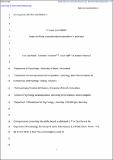Files in this item
Are apes essentialists? Scope and limits of psychological essentialism in great apes
Item metadata
| dc.contributor.author | Cacchione, Trix | |
| dc.contributor.author | Hrubesch, Christine | |
| dc.contributor.author | Call, Josep | |
| dc.contributor.author | Rakoczy, Hannes | |
| dc.date.accessioned | 2017-05-03T23:33:31Z | |
| dc.date.available | 2017-05-03T23:33:31Z | |
| dc.date.issued | 2016-09 | |
| dc.identifier | 242525693 | |
| dc.identifier | 63f6e840-243a-4aa3-9d78-afeacf8a7801 | |
| dc.identifier | 84965028251 | |
| dc.identifier | 000380662300006 | |
| dc.identifier.citation | Cacchione , T , Hrubesch , C , Call , J & Rakoczy , H 2016 , ' Are apes essentialists? Scope and limits of psychological essentialism in great apes ' , Animal Cognition , vol. 19 , no. 5 , pp. 921-937 . https://doi.org/10.1007/s10071-016-0991-4 | en |
| dc.identifier.issn | 1435-9448 | |
| dc.identifier.other | ORCID: /0000-0002-8597-8336/work/37478018 | |
| dc.identifier.uri | https://hdl.handle.net/10023/10702 | |
| dc.description.abstract | Human reasoning is characterized by psychological essentialism (Gelman, 2003): when reasoning about objects we distinguish between deep essential properties defining the object’s kind and identity, and merely superficial features that can be changed without altering the object’s identity. To date, it is unclear whether psychological essentialism is based on the acquisition of linguistic means (such as kind terms) and therefore uniquely human, or whether it is a more fundamental cognitive capacity which might be present also in the absence of language. In the present study, we addressed this question by testing whether, and if so, under which circumstances non-human apes also rely on psychological essentialism to identify objects. For this purpose, we adapted classical verbal transformation scenarios used in research on psychological essentialism (Keil, 1989), and implemented them in two nonverbal tasks: first, a box task, typically used to test object individuation (Experiment 1), and second, an object choice task, typically used to test object discrimination, object preferences and logical inferences (Experiments 2-4). Taken together, the results of the four experiments suggest that under suitable circumstances (when memory and other task demands are minimized), great apes engage in basic forms of essentialist reasoning. Psychological essentialism is thus possible also in the absence of language. | |
| dc.format.extent | 17 | |
| dc.format.extent | 1462832 | |
| dc.language.iso | eng | |
| dc.relation.ispartof | Animal Cognition | en |
| dc.subject | Object individuation | en |
| dc.subject | Essentialism | en |
| dc.subject | Comparative cognition | en |
| dc.subject | Categorization | en |
| dc.subject | Conceptual development | en |
| dc.subject | BF Psychology | en |
| dc.subject | NDAS | en |
| dc.subject.lcc | BF | en |
| dc.title | Are apes essentialists? Scope and limits of psychological essentialism in great apes | en |
| dc.type | Journal article | en |
| dc.contributor.institution | University of St Andrews. School of Psychology and Neuroscience | en |
| dc.contributor.institution | University of St Andrews. Centre for Social Learning & Cognitive Evolution | en |
| dc.identifier.doi | https://doi.org/10.1007/s10071-016-0991-4 | |
| dc.description.status | Peer reviewed | en |
| dc.date.embargoedUntil | 2017-05-03 | |
| dc.identifier.url | http://www.edge-cdn.net/video_1050448?playerskin=37016 | en |
| dc.identifier.url | http://www.edge-cdn.net/video_1050446?playerskin=37016 | en |
This item appears in the following Collection(s)
Items in the St Andrews Research Repository are protected by copyright, with all rights reserved, unless otherwise indicated.

